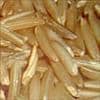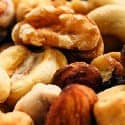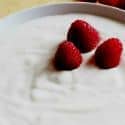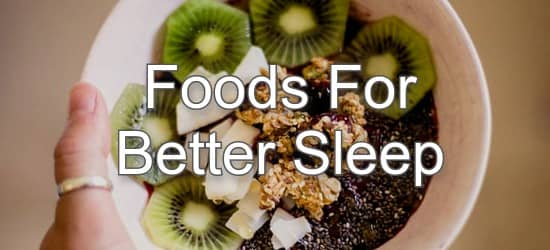The Best Foods To Relieve Stress

When faced with a stressful event, the body releases the stress hormones cortisol and noradrenalin (norepinephrine).
In the short term, these hormones help us to deal with the cause of our stress. However, when stress becomes chronic, as it often does with modern lifestyles, it leads to various negative effects upon our health and wellbeing.
We are all familiar with the symptoms of stress, such as raised heart rate, anxiety, and shortness of breath. In addition, stress affects our mood, ability to concentrate, our energy levels, appetite, and sleep.
Chronic or long-term stress can eventually affect other systems of the body such as the immune, digestive, and reproductive systems. This can result in increased susceptibility to colds and infections (1), an increased risk of digestive issues such as IBS, and fertility problems. Stress is also associated with an increased risk of various diseases such as cardiovascular disease and some cancers (2,3).
There are various ways to help manage stress and its consequences, some of which are outlined below. Eating a healthy, balanced diet is important to ensure you get the nutrients your body needs to stay resilient in the face of stress. Eating a wide range of plant foods, including at least 7 portions of fruit and vegetables every day, plus plenty of nuts, seeds, beans, lentils, and whole grains is fundamental.
Below is a list of research-backed foods to help relieve stress and get you back on track.
Best Foods for Stress Relief
-
 1. Soya Foods + Add
Soya is a top dietary source of tryptophan, from which the "happy hormone" serotonin is manufactured. Including foods that are high in tryptophan will ensure your body has the building blocks to produce adequate serotonin. One study suggests that eating tryptophan-enriched cereal for 3 weeks raised serotonin levels, improved mood, and reduced anxiety in elderly subjects (4). Other good sources of tryptophan include nuts, seeds, chicken, turkey, fish, beans, and eggs.
1. Soya Foods + Add
Soya is a top dietary source of tryptophan, from which the "happy hormone" serotonin is manufactured. Including foods that are high in tryptophan will ensure your body has the building blocks to produce adequate serotonin. One study suggests that eating tryptophan-enriched cereal for 3 weeks raised serotonin levels, improved mood, and reduced anxiety in elderly subjects (4). Other good sources of tryptophan include nuts, seeds, chicken, turkey, fish, beans, and eggs.
Nutrition Facts for Boiled Soybeans (Edamame). -
2. Blueberries + Add
Blueberries are rich in flavonoids, which stimulate the production of nitric oxide, a natural substance that causes blood vessels to relax. This can improve blood flow and oxygen delivery to the brain and has been shown to enhance cognitive function and health (5). Flavonoids also support blood sugar balance for stable energy levels and mood and blueberries are high in vitamin C, which is needed for supporting the body's stress systems.
Nutrition Facts for Blueberries. -
 3. Cocoa + Add
Cocoa contains a substance called phenylethylamine (PEA), which is the neurotransmitter (brain chemical) released when we fall in love, leading to feelings of pleasure, emotional well-being, and even bliss (6). Various studies have observed immediate improvements in mood after eating chocolate (7,8). Cocoa is another top source of flavonoids for supporting brain health and function (5) and is rich in magnesium, which helps promote relaxation. Despite the immediate stress-relieving benefits, overconsumption of chocolate or long-term use of chocolate is unlikely to relieve stress in the long term (8). Eat chocolate in moderation when coping with chronic stress.
3. Cocoa + Add
Cocoa contains a substance called phenylethylamine (PEA), which is the neurotransmitter (brain chemical) released when we fall in love, leading to feelings of pleasure, emotional well-being, and even bliss (6). Various studies have observed immediate improvements in mood after eating chocolate (7,8). Cocoa is another top source of flavonoids for supporting brain health and function (5) and is rich in magnesium, which helps promote relaxation. Despite the immediate stress-relieving benefits, overconsumption of chocolate or long-term use of chocolate is unlikely to relieve stress in the long term (8). Eat chocolate in moderation when coping with chronic stress.
Nutrition Facts for Dark Chocolate (70-85% Cocoa). -
 4. Chamomile Tea + Add
Traditionally used for centuries as a remedy for anxiety, chamomile contains a substance called apigenin with mild anti-anxiety and sedative properties that bind to the same receptors in the body as sedative drugs, but it is completely natural (9). One study found improvements in anxiety and mood in people with mild to moderate generalised anxiety disorder, following 8 weeks of chamomile extract (10).
4. Chamomile Tea + Add
Traditionally used for centuries as a remedy for anxiety, chamomile contains a substance called apigenin with mild anti-anxiety and sedative properties that bind to the same receptors in the body as sedative drugs, but it is completely natural (9). One study found improvements in anxiety and mood in people with mild to moderate generalised anxiety disorder, following 8 weeks of chamomile extract (10).
Nutrition Facts for Beverages, tea, herb, brewed, chamomile. -
 5. Whole Grains + Add
A diet rich in whole grains such as oats, brown rice, and wholewheat pasta helps stress-prone people cope better with stressful situations according to a Dutch study (11). These foods contain complex carbohydrates and vitamin B3, which play and important part in the creation of the "happy hormone" serotonin. Whole grains are also high in fiber which feeds good bacteria living in the gut, which subsequently benefits mental health (see below).
5. Whole Grains + Add
A diet rich in whole grains such as oats, brown rice, and wholewheat pasta helps stress-prone people cope better with stressful situations according to a Dutch study (11). These foods contain complex carbohydrates and vitamin B3, which play and important part in the creation of the "happy hormone" serotonin. Whole grains are also high in fiber which feeds good bacteria living in the gut, which subsequently benefits mental health (see below).
Nutrition Facts for Cooked Brown Rice. -
 6. Oily Fish (Salmon) + Add
Oily fish are rich in the omega-3 fats DHA and EPA, vital for a healthy brain and nerve function, and to help balance emotions. Low levels of omega-3s have been reported in people with anxiety and some studies have found supplements have the potential to reduce some of the symptoms of anxiety (12). Higher fish consumption is also linked with a reduced risk of depression (13). Oily fish is the best dietary source of vitamin D, which helps promote a positive mood, especially in winter (14).
6. Oily Fish (Salmon) + Add
Oily fish are rich in the omega-3 fats DHA and EPA, vital for a healthy brain and nerve function, and to help balance emotions. Low levels of omega-3s have been reported in people with anxiety and some studies have found supplements have the potential to reduce some of the symptoms of anxiety (12). Higher fish consumption is also linked with a reduced risk of depression (13). Oily fish is the best dietary source of vitamin D, which helps promote a positive mood, especially in winter (14).
Nutrition Facts for Cooked Atlantic Salmon (Farmed). -
 7. Nuts + Add
Nuts are rich in magnesium, which stimulates the release of a neurotransmitter called GABA in the brain that calms the nervous system and the mind (15). Magnesium is beneficial for various stress-related health conditions such as restless leg syndrome (16), migraine (17), and headaches (18). Nuts and seeds are also a source of tryptophan for serotonin production and walnuts, chia, hemp, and flax seeds are a source of plant-based omega-3s.
7. Nuts + Add
Nuts are rich in magnesium, which stimulates the release of a neurotransmitter called GABA in the brain that calms the nervous system and the mind (15). Magnesium is beneficial for various stress-related health conditions such as restless leg syndrome (16), migraine (17), and headaches (18). Nuts and seeds are also a source of tryptophan for serotonin production and walnuts, chia, hemp, and flax seeds are a source of plant-based omega-3s.
Nutrition Facts for Brazilnuts. -
 8. Probiotic Foods + Add
The gut bacteria or "microbiome" influence psychological health via the gut-brain axis, which is a two-way communication between the gut and the central nervous system. A 2016 meta-analysis (a large study, pooling the results of many studies) found that probiotic supplements reduced symptoms of stress, depression, and anxiety in healthy people (19). Fermented foods containing natural probiotics include live yogurt, kefir, sauerkraut, kimchi, kombucha, and some artisan cheeses.
8. Probiotic Foods + Add
The gut bacteria or "microbiome" influence psychological health via the gut-brain axis, which is a two-way communication between the gut and the central nervous system. A 2016 meta-analysis (a large study, pooling the results of many studies) found that probiotic supplements reduced symptoms of stress, depression, and anxiety in healthy people (19). Fermented foods containing natural probiotics include live yogurt, kefir, sauerkraut, kimchi, kombucha, and some artisan cheeses.
Nutrition Facts for Non Fat Yogurt. -
 9. Turmeric + Add
A recent 2021 study found that turmeric extract improved mental health and mood disturbance in overweight, but otherwise healthy people. Mental health scores improved and negative mood, anger, and hostility were all reduced after 12 weeks (20). Turmeric is well known to have anti-inflammatory properties and this is believed to be the reason for these effects. Low-grade, chronic inflammation is believed to be associated with many health problems, including depression and other mental health conditions (21,22,23).
9. Turmeric + Add
A recent 2021 study found that turmeric extract improved mental health and mood disturbance in overweight, but otherwise healthy people. Mental health scores improved and negative mood, anger, and hostility were all reduced after 12 weeks (20). Turmeric is well known to have anti-inflammatory properties and this is believed to be the reason for these effects. Low-grade, chronic inflammation is believed to be associated with many health problems, including depression and other mental health conditions (21,22,23).
Nutrition Facts for Ground Turmeric. -
 10. Green Vegetables + Add
Green vegetables such as broccoli, spinach and kale are high in several nutrients that benefit the nervous system, including magnesium, folate, fiber, B vitamins, iron, and vitamin C. Magnesium deficiency has been linked with psychological stress (24) and supplements have shown benefits for anxiety sufferers (25). Low folate levels have been linked with depression (26,27). Both iron and B vitamins are required for energy production in the body and a lack can lead to fatigue and low mood.
10. Green Vegetables + Add
Green vegetables such as broccoli, spinach and kale are high in several nutrients that benefit the nervous system, including magnesium, folate, fiber, B vitamins, iron, and vitamin C. Magnesium deficiency has been linked with psychological stress (24) and supplements have shown benefits for anxiety sufferers (25). Low folate levels have been linked with depression (26,27). Both iron and B vitamins are required for energy production in the body and a lack can lead to fatigue and low mood.
Nutrition Facts for Cooked Broccoli (Boiled, Drained). -
 11. Guavas + Add
Guavas are a top source of vitamin C, which has been shown to reduce stress hormone levels. One study gave healthy adults vitamin C supplements for 2 weeks and then gave them a stress test (involving public speaking and mental arithmetic). They experienced smaller elevations in blood pressure, had lower anxiety scores and their stress hormone levels returned to normal more quickly after the test compared with the placebo group (28). Other top sources of vitamin C include kiwifruit, red peppers, citrus fruit, strawberries, papaya, and broccoli.
11. Guavas + Add
Guavas are a top source of vitamin C, which has been shown to reduce stress hormone levels. One study gave healthy adults vitamin C supplements for 2 weeks and then gave them a stress test (involving public speaking and mental arithmetic). They experienced smaller elevations in blood pressure, had lower anxiety scores and their stress hormone levels returned to normal more quickly after the test compared with the placebo group (28). Other top sources of vitamin C include kiwifruit, red peppers, citrus fruit, strawberries, papaya, and broccoli.
Nutrition Facts for Guavas.
Stress Relieving Techniques
- Yoga and meditation are scientifically proven to reduce stress levels. The more often you practice, the more benefits you will experience (29).
- Exercise is as effective as medication for treating mild to moderate depression and releases stress-relieving brain chemicals. Exercising outside in the morning has further benefits, due to the exposure to natural daylight (30).
- Spending time in nature has proven benefits for mental well-being. Walking or running in the countryside, beach, park or forest is a great way to reap more benefits from your exercise (31).
- Sleep deprivation is a form of stress on the body, and is unfortunately common these days (32). Prioritizing sleep is therefore key to managing stress. For more info see the top 10 foods for better sleep.
- Vitamin D is essential for helping ward off depression and keeping us physically and mentally healthy (33). 90% of our total vitamin D comes from the action of sunlight on the skin, so getting some safe sunlight exposure is beneficial. You could also include a supplement during winter as an "insurance policy", especially if you've had limited sun exposure or have darker skin.
- Caffeine - While moderate amounts of caffeine might ward off symptoms of depression (34), caffeine disrupts blood sugar balance, sleep cycles and causes the release of the stress hormone adrenalin (35,36). Avoid caffeine completely if your stress levels are high, otherwise, limit yourself to 1-2 coffees or teas per day.
- Sugar and refined carbohydrates can lead to blood sugar highs and lows, which can unbalance mood and energy levels (37). Instead, eat whole grains combined with protein whenever possible to balance blood sugar levels and mood.
Related
Data Sources and References
- Frick LR, Arcos ML, Rapanelli M, Zappia MP, Brocco M, Mongini C, Genaro AM, Cremaschi GA. The effect of stress on the defense systems Stress. 2009 Mar;12(2):134-43. doi: 10.1080/10253890802137437. 18609297
- Swaab DF, Bao AM, Lucassen PJ. Chronic Stress Promotes Cancer Development Ageing Res Rev. 2005 May;4(2):141-94. doi: 10.1016/j.arr.2005.03.003. 15996533
- Huang Y, Hu Y, Mai W. Stress and cardiovascular disease Nat Rev Cardiol. 2012 Oct;9(10):598; author reply 598. doi: 10.1038/nrcardio.2012.45-c1. Epub 2012 Aug 14. 22889951
- Cubero J, Chanclón B, Sánchez S, Rivero M, RodrÃguez AB, Barriga C. Tryptophan-enriched cereal intake improves nocturnal sleep, melatonin, serotonin, and total antioxidant capacity levels and mood in elderly humans Nutr Neurosci. 2009 Dec;12(6):272-80. doi: 10.1179/147683009X423490. 19925721
- Mastroiacovo D, Kwik-Uribe C, Grassi D, Necozione S, Raffaele A, Pistacchio L, Righetti R, Bocale R, Lechiara MC, Marini C, Ferri C, Desideri G. Neurocognitive Effects of Cocoa and Red-Berries Consumption in Healthy Adults Am J Clin Nutr. 2015 Mar;101(3):538-48. doi: 10.3945/ajcn.114.092189. Epub 2014 Dec 17. 25733639
- Lynnes T, Horne SM, Prüß BM. β-phenylethylamine, a small molecule with a large impact Meat Sci. 2014 Jan;96(1):165-71. doi: 10.1016/j.meatsci.2013.06.030. Epub 2013 Jul 4. 23896151
- Macht M, Dettmer D. Immediate effects of chocolate on experimentally induced mood states Appetite. 2006 May;46(3):332-6. doi: 10.1016/j.appet.2006.01.014. Epub 2006 Mar 20. 16546294
- Wong SY, Lua PL. Mood state effects of chocolate Malays J Nutr. 2011 Aug;17(2):259-69. 22303579
- Viola H, Marder M, Nuñez J, Izquierdo L, Wasowski C, Wolfman C, Ardenghi P, Barros D, Medina JH, Paladini AC. Apigenin, a component of Matricaria recutita flowers, is a central benzodiazepine receptors-ligand with anxiolytic effects Biochem Biophys Res Commun. 1999 Sep 7;262(3):643-6. doi: 10.1006/bbrc.1999.1273. 10471378
- Amsterdam JD, Shults J, Soeller I, Mao JJ, Rockwell K, Newberg AB. A randomized, double-blind, placebo-controlled trial of oral Matricaria recutita (chamomile) extract therapy for generalized anxiety disorder Altern Ther Health Med. 2012 Sep-Oct;18(5):44-9. 22894890
- Markus CR, Panhuysen G, Jonkman LM, Bachman M. Does carbohydrate-rich, protein-poor food prevent a deterioration of mood and cognitive performance of stress-prone subjects when subjected to a stressful task? Br J Nutr. 1999 Dec;82(6):457-67. 10690161
- Ross BM, Seguin J, Sieswerda LE. Omega-3 polyunsaturated fatty acids and anxiety disorders Lipids Health Dis. 2007 Sep 18;6:21. doi: 10.1186/1476-511X-6-21. 17877810
- Wu S, Ding Y, Wu F, Li R, Hou J, Mao P. Fish consumption and risk of depression: Epidemiological evidence from prospective studies Neurosci Biobehav Rev. 2015 Jan;48:1-9. doi: 10.1016/j.neubiorev.2014.11.008. Epub 2014 Nov 21. 25446949
- Meier C, Woitge HW, Witte K, Lemmer B, Seibel MJ. Vitamin D3 enhances mood in healthy subjects during winter J Bone Miner Res. 2004 Aug;19(8):1221-30. doi: 10.1359/JBMR.040511. Epub 2004 May 24. 15231008
- Przegaliński E, Tatarczyńska E, Chojnacka-Wójcik E. Benzodiazepine/GABA(A) receptors are involved in magnesium-induced anxiolytic-like behavior in mice Neuropharmacology. 2000 Jul 24;39(10):1858-64. doi: 10.1016/s0028-3908(00)00023-x. 10884566
- Ferri R, Gschliesser V, Frauscher B, Poewe W, Högl B. Magnesium therapy for periodic leg movements-related insomnia and restless legs syndrome: an open pilot study Clin Neurophysiol. 2009 Feb;120(2):257-63. doi: 10.1016/j.clinph.2008.11.006. Epub 2008 Dec 23. 19109055
- Pfaffenrath V, Wessely P, Meyer C, Isler HR, Evers S, Grotemeyer KH, Taneri Z, Soyka D, Göbel H, Fischer M. Prophylaxis of migraine with oral magnesium: results from a prospective, multi-center, placebo-controlled and double-blind randomized study Cephalalgia. 1996 Oct;16(6):436-40. doi: 10.1046/j.1468-2982.1996.1606436.x. 8902254
- Altura BM, Altura BT. Intravenous magnesium sulfate rapidly alleviates headaches of various types Alcohol. 1999 Oct;19(2):119-30. doi: 10.1016/s0741-8329(99)00025-7. 10548155
- Pirbaglou M, Katz J, de Souza RJ, Stearns JC, Motamed M, Ritvo P. Probiotics and Subclinical Psychological Symptoms in Healthy Participants: A Systematic Review and Meta-Analysis Nutr Res. 2016 Sep;36(9):889-898. doi: 10.1016/j.nutres.2016.06.009. Epub 2016 Jun 21. 27632908
- Uchio R, Okuda-Hanafusa C, Saji R, Kawasaki K, Muroyama K, Murosaki S, Yamamoto Y, Hirose Y. Curcuma longa extract improves serum inflammatory markers and mental health in healthy participants who are overweight: a randomized, double-blind, placebo-controlled trial Nutrients. 2022 Sep 13;14(18):3763. doi: 10.3390/nu14183763. 36145139
- Schmidt FM, Kirkby KC, Lichtblau N. Inflammation in Depression and the Potential for Anti-Inflammatory Treatment Curr Neuropharmacol. 2016;14(7):674-87. doi: 10.2174/1570159x14666160115130414. 26769225
- Freedman R. Inflammation: depression fans the flames and feasts on the heat Am J Psychiatry. 2015 Nov 1;172(11):1051. doi: 10.1176/appi.ajp.2015.15091219. 26575442
- Kiecolt-Glaser JK, Derry HM, Fagundes CP. The Bidirectional Relationship of Depression and Inflammation: Double Trouble Am J Psychiatry. 2015 Nov 1;172(11):1075-91. doi: 10.1176/appi.ajp.2015.15020152. Epub 2015 Sep 11. 26357876
- Durlach J. Magnesium Status and Stress: The Vicious Circle Concept Revisited Magnes Res. 1989 Sep;2(3):195-203. 2701269
- Boyle NB, Lawton CL, Dye L. The Effects of Magnesium Supplementation on Subjective Anxiety and Stress-A Systematic Review Magnes Res. 2016 Mar 1;29(3):120-125. doi: 10.1684/mrh.2016.0411. 27869100
- Watanabe H, Ishida S, Konno Y, Matsumoto M, Nomachi S, Masaki K, Okayama H, Nagai Y. The association of folate and depression: A meta-analysis J Midwifery Womens Health. 2012 Jan-Feb;57(1):43-8. doi: 10.1111/j.1542-2011.2011.00073.x. Epub 2011 Sep 23. 22251911
- Murakami K, Mizoue T, Sasaki S, Ohta M, Sato M, Matsushita Y, Mishima N. Impact of dietary folate intake on depressive symptoms in young women of reproductive age Nutrition. 2008 Feb;24(2):140-7. doi: 10.1016/j.nut.2007.10.013. Epub 2007 Dec 3. 18061404
- Kudielka BM, Fischer JE, Metzenthin P, Helfricht S, Preckel D, von Känel R. A randomized controlled trial of high dose ascorbic acid for reduction of blood pressure, cortisol, and subjective responses to psychological stress Neuropsychobiology. 2007;56(2-3):159-66. doi: 10.1159/000115783. Epub 2008 Feb 7. 18259090
- Léonard MJ, Bélisle MP, Bourdon O, Neveu SM, El-Baalbaki G. Impact of a Yoga and Meditation Intervention on Students' Stress and Anxiety Levels Am J Pharm Educ. 2021 May;85(5):8329. doi: 10.5688/ajpe8329. 34283731
- Wang CW, Chan CH, Ho RT, Chan JS, Ng SM, Chan CL. An examination of the anxiolytic effects of exercise for people with anxiety and stress-related disorders: A meta-analysis BMC Complement Altern Med. 2014 Jan 9;14:8. doi: 10.1186/1472-6882-14-8. 24400778
- Qu W, Liu S, Zhang W, Zhu H, Tao Q, Wang H, Yan H. Impact of outdoor nature-related activities on gut microbiota, fecal serotonin, and perceived stress in preschool children: the Play&Grow randomized controlled trial Food Funct. 2019 Sep 1;10(9):5886-5897. doi: 10.1039/c9fo00399a. Epub 2019 Aug 29. 31464319
- Alsaggaf MA, Wali SO, Merdad RA, Merdad LA. The prevalence and association of stress with sleep quality among medical students Saudi Med J. 2016 Feb;37(2):173-82. doi: 10.15537/smj.2016.2.14288. 26837401
- Guzek D, Kołota A, Lachowicz K, Skolmowska D, Stachoń M, Głąbska D. The Influence of Vitamin D Intake and Status on Mental Health in Children: A Systematic Review Nutrients. 2021 Oct 20;13(11):3678. doi: 10.3390/nu13113678. 34835934
- Kazemi S, Keshteli AH, Saneei P, Afshar H, Esmaillzadeh A, Adibi P. Coffee and caffeine intake in relation to symptoms of psychological disorders among adults Front Nutr. 2021 Jul 27;8:710555. doi: 10.3389/fnut.2021.710555. eCollection 2021. 34386515
- Ãgoston C, Urbán R, Richman MJ, Demetrovics Z. Prevalence and Correlates of Caffeine Use Disorder Symptoms Among a United States Sample Addict Behav. 2018 Jun;81:109-116. doi: 10.1016/j.addbeh.2018.02.012. Epub 2018 Feb 9. 29454178
- Henry JP, Stephens-Larson P. Caffeine as an intensifier of stress-induced hormonal and pathophysiologic changes in mice Hypertension. 1984 May-Jun;6(3):437-44. doi: 10.1161/01.hyp.6.3.437. 6539755
- Kendig MD, Morris MJ. Sugar rush or sugar crash? A meta-analysis of carbohydrate effects on mood Neurosci Biobehav Rev. 2019 Sep;104:56-57. doi: 10.1016/j.neubiorev.2019.06.028. Epub 2019 Jun 29. 31265871
Simplify Nutrition Tracking with MyFoodData!
Speedy Tools and Detailed Data FREEEasily analyze your meals to find the best foods for your goals.
✅ Use our recipe nutrition calculator and nutrition comparison tool.
✅ Access expert nutrition data tools and in-depth articles.
✅ Log foods and organize your recipes with a free account.


 Next ➞
Next ➞
